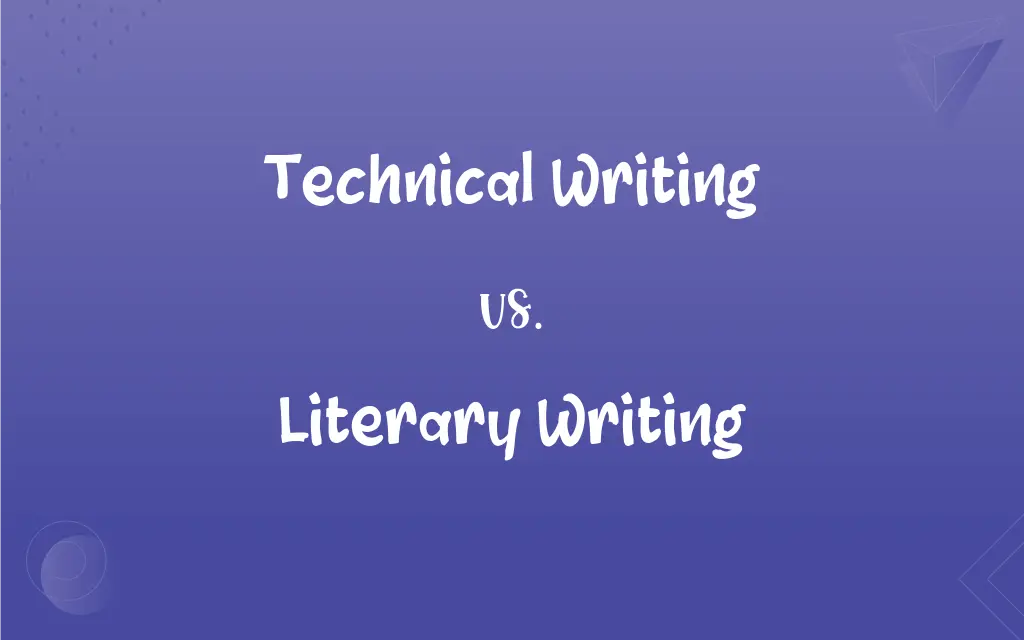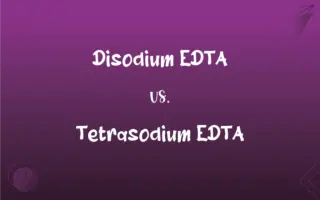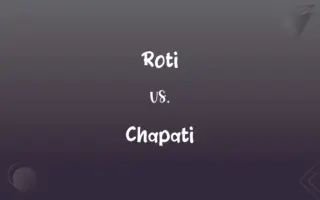Technical Writing vs. Literary Writing: What's the Difference?
Edited by Janet White || By Harlon Moss || Updated on October 7, 2023
Technical writing conveys clear, concise instructional information. Literary writing explores narrative, thematic, and aesthetic elements to engage readers.

Key Differences
Technical writing serves to communicate complex information in a simplified and easily understandable manner. Its primary focus is to convey technical or specialized knowledge effectively to the reader. Technical writing embraces clarity and straightforwardness to ensure that the communicated information is easily digestible and accessible to its targeted audience, which can range from experts to general readers.
On the other hand, literary writing is an art form that seeks to create emotional, thematic, and aesthetic experiences through the use of language. The intent behind literary writing diverges significantly from that of technical writing, aiming to evoke emotions, conjure images, and navigate through various themes and narratives. It is a form of expression that moves beyond the mere communication of facts or data.
In technical writing, language is used as a functional tool designed to inform and instruct the reader. Whether it’s a manual, report, or a technical guide, the primary objective remains clear: to elucidate and educate, ensuring that the text is practically useful and applicative. Accuracy, coherence, and clarity stand at the forefront of technical writing, leaving no room for ambiguity.
Contrastingly, literary writing thrives on ambiguity, symbolism, and a richness of language that is often meant to be savored and pondered upon. Literary writing can be seen in novels, poems, and short stories that delve into imaginative, philosophical, and sometimes abstract worlds, offering readers an escape, reflection, or an immersive experience into varied facets of human existence and creativity.
While technical writing and literary writing both value precision and effective communication, they utilize language and structure in distinctly different ways. Technical writing extracts and simplifies, prioritizing directness, while literary writing embellishes and explores, offering multifaceted explorations of themes and emotions.
ADVERTISEMENT
Comparison Chart
Purpose
To inform and instruct.
To entertain, evoke emotion, and reflect.
Language Usage
Clear, direct, and unambiguous.
Rich, metaphorical, and symbolic.
Structure
Logical, segmented, and straightforward
Can be linear, nonlinear, or experimental.
Audience Engagement
Objective, standardized communication.
Subjective and emotionally engaging.
Style and Tone
Formal and impersonal.
Varies widely, can be informal and personal.
ADVERTISEMENT
Technical Writing and Literary Writing Definitions
Technical Writing
Technical writing is usually informative and instructive.
The technical writing in the user guide provides step-by-step instructions on using the appliance.
Literary Writing
Literary writing explores thematic and emotional narratives.
Her literary writing weaved a poignant tale of loss and recovery.
Technical Writing
Technical writing prioritizes clarity and precision.
Her technical writing in the report meticulously outlined the software’s functionalities.
Literary Writing
Literary writing often explores human experiences and imaginings.
The short story, through adept literary writing, offered a glimpse into a fantastical world.
Technical Writing
Technical writing adheres to a structured format.
The article demonstrated effective technical writing by systematically presenting the research findings.
Literary Writing
Literary writing utilizes figurative and expressive language.
The novel was celebrated for its lush and evocative literary writing.
Technical Writing
Technical writing simplifies complex information.
The manual, a product of technical writing, clearly explains the assembly process of the furniture.
Literary Writing
Literary writing seeks to evoke emotional responses.
His literary writing, rich with metaphor, moved readers to tears.
Technical Writing
Technical writing often uses specialized terminology.
The technical writing in the scientific journal detailed the methodology using industry-specific jargon.
Literary Writing
Literary writing can experiment with structure and form.
The literary writing in the poem played innovatively with structure, creating a visual impact.
FAQs
What emotional depth does literary writing seek to provide?
Literary writing endeavors to evoke emotions and provide deep, often reflective or imaginative experiences.
Can technical writing include elements of literary writing?
While it’s unusual, technical writing can utilize literary elements for creative expression, without compromising clarity.
What is the primary purpose of technical writing?
Technical writing aims to communicate specific, complex information in a clear and understandable way.
Can literary writing be as clear and concise as technical writing?
While it can be, literary writing often employs a more embellished and nuanced use of language and structure.
How flexible is the structure in technical writing?
Technical writing follows a structured, logical format to ensure clear and accessible information delivery.
Are personal narratives found in technical writing?
Generally, no; technical writing prioritizes factual, impersonal information and instructions.
In what career might technical writing be a crucial skill?
Careers in engineering, science, technology, and any field requiring clear, specific communication of complex information.
Is literary writing always fictional?
No, literary writing can explore non-fictional themes and narratives but often with an emotive or aesthetic touch.
Why might an author choose a non-linear structure in literary writing?
Authors may use non-linear structures in literary writing to explore themes, characters, or events from various perspectives.
Can technical writing exist in a literary text?
Yes, elements of technical writing might appear in literary texts, such as scientific explanations within a narrative.
What role does specialized jargon play in technical writing?
Specialized jargon in technical writing conveys precision and caters to specific expert audiences.
Is ambiguity typically embraced in literary writing?
Yes, literary writing often uses ambiguity to explore themes and provoke thought and emotion.
Is literary writing typically present in academic papers?
While uncommon, elements of literary writing might appear in academic papers to enhance engagement or explore concepts creatively.
What’s a typical example of technical writing?
Manuals, reports, and guides that convey specific information and instructions are typical examples of technical writing.
Is it necessary for literary writing to follow grammatical rules strictly?
Not always; literary writing often experiments with language and may intentionally diverge from strict grammatical rules for stylistic or thematic reasons.
How important is creativity in literary writing?
Creativity is crucial in literary writing, influencing thematic exploration, character development, and linguistic expression.
Can a piece of writing be both predominantly literary and technical?
While one typically dominates, a piece can blend both, such as a narrative with in-depth technical explanations.
How significant is the reader’s understanding in technical writing?
Extremely significant; technical writing seeks to convey information that the reader can comprehend and use effectively.
Can literary writing and technical writing target the same audience?
Yes, both can target similar audiences but typically cater to different needs and expectations of the readers.
Is it common to find literary writing in scientific publications?
Rarely; scientific publications prioritize technical writing for accuracy and clear communication of findings.
About Author
Written by
Harlon MossHarlon is a seasoned quality moderator and accomplished content writer for Difference Wiki. An alumnus of the prestigious University of California, he earned his degree in Computer Science. Leveraging his academic background, Harlon brings a meticulous and informed perspective to his work, ensuring content accuracy and excellence.
Edited by
Janet WhiteJanet White has been an esteemed writer and blogger for Difference Wiki. Holding a Master's degree in Science and Medical Journalism from the prestigious Boston University, she has consistently demonstrated her expertise and passion for her field. When she's not immersed in her work, Janet relishes her time exercising, delving into a good book, and cherishing moments with friends and family.































































